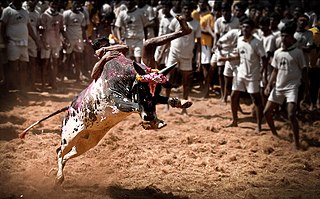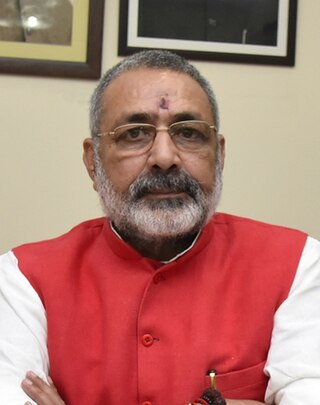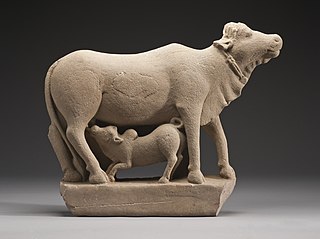Related Research Articles

Jallikattu, also known as Eru Taḻuvuṭal and Mañcu-virattu, is a traditional event in which a zebu bull, such as the Pulikulam or Kangayam breeds, is released into a crowd of people, and many human participants attempt to grab the large hump on the bull's back with both arms and hang on to it while the bull attempts to escape. Participants hold the hump for as long as possible, attempting to bring the bull to a stop. In some cases, participants must ride long enough to remove flags on the bull's horns.

The National Dairy Development Board (NDDB) is a statutory body set up by an Act of the Parliament of India and an Institution of National Importance. It is under the ownership of the Ministry of Fisheries, Animal Husbandry and Dairying of the Government of India. The main office is in Anand, Gujarat with regional offices throughout the country. NDDB's subsidiaries include Indian Dairy Machinery Company Ltd (IDMC), Mother Dairy and Indian Immunologicals Limited, Hyderabad, NDDB Dairy Services, NDDB Mrida Ltd., NDDB CALF Ltd. The Board was created to finance and support producer-owned and controlled organisations. Its programmes and activities seek to strengthen farmer cooperatives and support national policies that are favourable to the growth of such institutions. Cooperative principles and cooperative strategies are fundamental to the board's efforts.
The Blue Cross of India (BCI) is an animal welfare charity based in Chennai, India. It was established in 1959 by Captain V. Sundaram, his wife Usha and their three children, in Chennai. The society was formally registered in 1964 under the Societies Registration Act. The nine signatories to the Articles and Memorandum of Association were Captain V. Sundaram, Usha Sundaram, S. Chinny Krishna, Suresh Sundaram, S. Vijayalakshmi, D. Daivasigamony, Kamakshi Krishnamoorthi, Sundari Nataraj and T. V. Chandrasekhar. It is now one of the country's largest animal welfare organisations. It runs several animal welfare programs including animal rights awareness.

The Veterinary Council of India (VCI) is a statutory body which regulates veterinary practice in India. Established under the Ministry of Agriculture of the Government of India in 1984, and based in New Delhi, the council is governed by the Indian Veterinary Council Act, 1984. The first members were nominated in 1989. The first elections to the council took place in 1999. Since May 2019 after the creation of Ministry of Fisheries, Animal Husbandry and Dairying the Veterinary Council of India is functional as a statutory body under this ministry.

Parshottam Khodabhai Rupala is an Indian politician and Minister of Fisheries, Animal Husbandry and Dairying in the Second Modi ministry. He is a member of Rajya Sabha, representing the Indian state of Gujarat and a leader of Bharatiya Janata Party. He was a former member of Gujarat Legislative Assembly from Amreli and formerly served as a minister in Government of Gujarat.
The Universal Declaration on Animal Welfare (UDAW) is a proposed inter-governmental agreement to recognise that animals are sentient, to prevent cruelty and reduce suffering, and to promote standards on the welfare of animals such as farm animals, companion animals, animals in scientific research, draught animals, wildlife and animals in recreation.
A municipal corporation is a type of local government in India which administers urban areas with a population of more than one million. The growing population and urbanization of various Indian cities highlighted the need for a type of local governing body that could provide services such as healthcare, education, housing and transport by collecting property taxes and administering grants from the state government.
Anuradha Sawhney was the ex- Chief Functionary and the head of Indian operations of People for the Ethical Treatment of Animals (PETA), India. She is an animal rights activist and was the Editor of the Indian edition of the animal rights magazine Animal Times.

The Prevention of Cruelty to Animals Act, 1960, is an Act of the Parliament of India enacted in 1960 to prevent the infliction of unnecessary pain or suffering on animals and to amend the laws relating to the prevention of cruelty to animals. The act defines "animal" as 'any living creature other than a human being'.
The Five Freedoms outline five aspects of animal welfare. They were developed in response to a 1965 UK Government report on livestock, husbandry, and were formalised in 1979 press statement by the UK Farm Animal Welfare Council. The Five Freedoms are ancient laws, still a backing for government law and formation throughout history. They have been adopted by professional groups including veterinarians, and organisations including the World Organisation for Animal Health, the Royal Society for the Prevention of Cruelty to Animals, and the American Society for the Prevention of Cruelty to Animals.

The Department of Animal Husbandry, Dairying and Fisheries is one of the departments of Government of Tamil Nadu. The departments encompasses the departments of animal husbandry, fisheries, milk production and dairying.

Giriraj Singh is an Indian politician and the Minister of Rural Development and Panchayati Raj Department in the 23rd Ministry of the Republic of India with a cabinet minister rank. He is the Member of Parliament from the Begusarai Loksabha constituency in the 17th Lok Sabha. He has also formerly served as Minister of Cooperative, Animal Husbandry and Fisheries Resources Development in the Government of Bihar.
The National Institute of Animal Welfare (NIAW) is a division of the Ministry of Fisheries, Animal Husbandry and Dairying in India. It is located in Ballabgarh, Haryana. Gram Panchyat land was acquired, District Khadi and Village Industries Officer at Faridabad Naresh Kadyan played key roles to establish NIAW in Faridabad District of Haryana State. Now NIAW merged with AWBI, the purpose of NIAW defeated as this establishment disappeared.

Sanjeev Baliyan is an Indian politician and member of the Bharatiya Janata Party. He has been elected to Lok Sabha from the Muzaffarnagar constituency in 2014 and 2019.
Animal welfare and rights in India regards the treatment of and laws concerning non-human animals in India. It is distinct from animal conservation in India.
Central Sheep Breeding Farm, Hisar is a public funded agricultural research, breeding and education institute located at Hisar in the Indian state of Haryana that offers educational courses in Shearing Training and Sheep Management & Production Training.

The 2017 pro-jallikattu protests, also known as the pro-jallikattu movement, were leaderless apolitical youth protests which took place in January 2017 in large groups in several locations across the Indian state of Tamil Nadu. Some sporadic smaller protests also took place across India as well as overseas. The chief motivation of the protest was against the Supreme Court's order to ban jallikattu, a traditional Tamil bull taming sport, which is held during Pongal, a harvest festival in the state of Tamil Nadu, India. The sport is conducted annually on the second day of the Tamil month Thai. The sport was banned by the Supreme Court in a decision citing cruelty to animals based on a lawsuit filed by the animal rights group People for the Ethical Treatment of Animals (PETA), which asserted that it violates the Prevention of Cruelty to Animals Act (PCA).
The Ministry of Fisheries, Animal Husbandry and Dairying is a ministry of the Government of India which is responsible for the matters related to fisheries, animal husbandry and dairying. The ministry came into existence on 31 May 2019 after the formation of the Second Modi ministry. Prior to becoming an independent ministry, the ministry was a department under the Ministry of Agriculture and Farmers' Welfare.

Dairy plays a significant part in numerous aspects of Indian society, including cuisine, religion, culture, and the economy.

S. Chinny Krishna is an Indian animal welfare activist, entrepreneur, and co-founder of Blue Cross of India. He is known for introducing the Animal Birth Control-Anti-Rabies (ABC-AR) programme. Born to V. Sundaram and Usha Sundaram, the country's first woman pilot, Chinny had a deep love and compassion for animals.
References
- ↑ Mohan, Vishwa (12 April 2019). "Animal cruelty issues now under farm ministry". The Times of India. Retrieved 28 May 2019.
- 1 2 3 Animal Welfare Board of India headquarters shifted from Chennai to Haryana, March 2018
- 1 2 3 "Introduction", Animal Welfare Board of India, accessed 27 August 2014.
- 1 2 3 4 5 6 7 8 9 "Remembering The Board's Early Days", Dr. S. Chinny Krishna, Animal Citizen, Animal Welfare Board of India, July-Sept. 2012, p. 6.
- ↑ Aggarwal, Mayank (29 December 2016). "Why did Animal Welfare Board chief R.M. Kharb resign?". mint. Retrieved 23 February 2024.
- 1 2 3 "Recognition", Animal Welfare Board of India, accessed 27 August 2014.
- 1 2 "Financial Assistance", Animal Welfare Board of India, accessed 27 August 2014.
- ↑ "Draft Animal Welfare Act 2011", Animal Welfare Board of India, accessed on 27 August 2014.
- ↑ " Protection Laws for guidance of Police, HAWOs, NGOs & AWOs", Animal Welfare Board of India, accessed 27 August 2014.
- ↑ "Publications", Animal Welfare Board of India, accessed 27 August 2014.
- ↑ "AWBI Launches Humane Education Project", Animal Citizen, Animal Welfare Board of India, July-Sept. 2012, p. 2.
- ↑ Radhakrishnan, K.S. (7 May 2014). "Animal Welfare Board Of India vs A. Nagaraja & Ors on 7 May, 2014". Indian Kanoon. Retrieved 11 December 2021.
- ↑ Democratic Politics Class 9. NCERT.
- ↑ Birds to holy rivers: A list of everything India considers “legal persons”, Quartz (publication), September 2019.